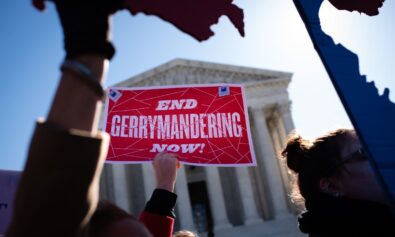NAACP president and CEO Ben Jealous and other members of the civil rights group met with local politicians and journalists on Monday as part of an effort to spur the release of a black imprisoned after shooting a white man on the shooter’s property.
John McNeil, 46, received a life sentence in November 2006 after killing a white man who was trespassing on his property. Police detectives investigating the case determined that McNeil acted in self-defense, but Cobb County District Attorney Pat Head decided a year later to try the case and won a conviction.
“If this can happen to John McNeil, then it can happen to [Georgia NAACP President] Ed DuBose, it can happen to William Barber, it can happen to Ben Jealous. It can happen to any black man standing out here or standing anywhere in America, no matter how much good you’ve done or how right you are,” the Rev. William Barber, president of the North Carolina NAACP, told the crowd in front of the Georgia State Capitol.
The case also has re-focused the spotlight on legal self-defense claims since the killing of Trayvon Martin in Florida. Prosecutors there initially declined to charge a multiracial Hispanic man, George Zimmerman, with a crime after he shot Martin, an unarmed black teenager, allegedly in self-defense. Zimmerman is now charged with second degree murder.
Barber, a longtime friend of McNeil’s, joined Jealous and other NAACP members in visiting McNeil in prison prior to the press conference.
The incident took place Dec. 6, 2005, when McNeil arrived home after his teenage son had called him about an unfamiliar man lurking about their property.
Brian Epp, a hired contractor with whom McNeil had past difficulties, had already pulled a knife on the teenager.
Epp refused to leave, and McNeil, who had called 9-1-1, fired a warning shot into the ground. Epp then charged toward McNeil while reaching into his pocket. McNeil fatally shot him in the head at close range. Court documents state that a pocketknife was clipped inside Epp’s pants pocket. McNeil’s neighbors who witnessed the incident backed his story.
Kennesaw police detectives investigated the case, decided that McNeil had acted in self-defense and didn’t charge him.
McNeil’s self-defense claim is supported by Georgia’s “castle doctrine law,” which allows an individual to use deadly force to protect his or her home, or anyone inside it, from a violent trespasser.
McNeil and his family thought the worst was over, until Head decided to pursue prosecution.
During the trial, McNeil’s neighbors, the two senior detectives investigating the case and a couple who said that they felt threatened by Epp when they hired him to do work all testified in McNeil’s defense. All of those individuals are white.
“We are victims at both ends of the gun,” said Marcus Coleman, who leads the Atlanta chapter of the National Action Network.
Jealous said his organization questions “stand-your-ground” laws that do not require a person, regardless of their location, to retreat from a perceived threat if they have an opportunity. But, Jealous said, “we have no qualms about the Castle Doctrine,” which governs threats that occur on personal property.
McNeil’s conviction in the face of that doctrine, Jealous said, means that in Georgia, “When it comes to protecting your home and your family, there is no law that can protect a black man from a biased system of justice.”
Jealous added that he would discuss the case with Georgia Governor Nathan Deal.


